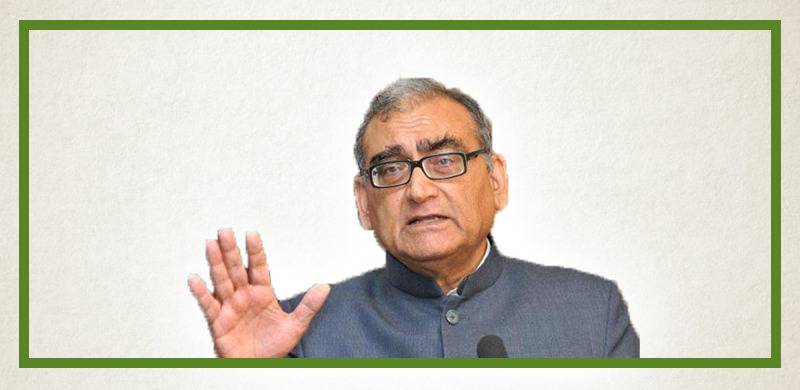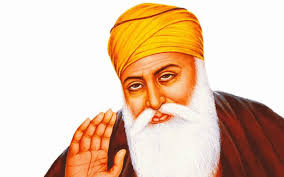
Today, 12th November, is Gurpurab, the birth anniversary of Guru Nanak (1469-1539), the founder of the Sikh religion. It will be celebrated by Sikhs all over the world. There are about 27 million Sikhs in the world, of which 83% live in India (only 1.72% of India's population), the bulk of them in the state of Punjab.
 When I went to Amritsar a few years back and visited the Sikhs' holiest shrine, the Golden Temple, I was presented a saropa (a saffron scarf bestowed on people being honoured) by the Jathedar, the head priest, for saving Devinderpal Singh Bhullar, who had been awarded the death sentence by the Supreme Court, but whom I thought had been wrongly convicted, from the gallows.
When I went to Amritsar a few years back and visited the Sikhs' holiest shrine, the Golden Temple, I was presented a saropa (a saffron scarf bestowed on people being honoured) by the Jathedar, the head priest, for saving Devinderpal Singh Bhullar, who had been awarded the death sentence by the Supreme Court, but whom I thought had been wrongly convicted, from the gallows.I was recently invited by some members of the Sikh community in the Bay Area of California, where I am staying presently, to address them in the town of Milpitas. Before the function a contingent of about 10 Sikhs met me and had a long discussion with me over a dinner they hosted.
 They told me that many Sikhs in the US had come not on visas but as refugees, due to the events in the 1980s in India. Many of them are Khalistan supporters, and hero worshippers of Jarnail Singh Bhindranwaale, the Sikh priest who was killed in Operation Blue Star. One of them asked me to delete a blog I had written criticising Bhindranwaale, but I refused, though I said I will not mention him in my speech.
They told me that many Sikhs in the US had come not on visas but as refugees, due to the events in the 1980s in India. Many of them are Khalistan supporters, and hero worshippers of Jarnail Singh Bhindranwaale, the Sikh priest who was killed in Operation Blue Star. One of them asked me to delete a blog I had written criticising Bhindranwaale, but I refused, though I said I will not mention him in my speech.In the function in Milpitas which I addressed I said that Sikhs have a great quality, and also a great defect.
The great quality of Sikhs
I said that the spirit of service ( seva bhaavana ) which I found in Sikhs, I did not find in any other community in the world. Whenever and wherever there is a calamity or catastrophe Sikhs will immediately rush to the spot to give aid to the victims. Recently there were floods in Bihar, whose capital Patna had almost become a lake. Sikh youth immediately rushed there to help the victims. In Gurgaon when a car went underwater, some Sikhs saved the occupants from certain death.
A video had gone viral of police sub inspector Gagandeep Singh who saved a Muslim youth in Uttaranchal who was having an affair with a Hindu girl from possibly being lynched by a furious mob, by taking their blows on his own body.
Many other such incidents can be cited showing the great spirit of service among Sikhs, and this is because of what Guru Nanak taught viz to serve mankind. The spirit of 'seva' (selfless service) is an integral part of the Sikh religion, mentioned in the Granth Sahib, the Sikhs' holy book.
I told the Sikhs gathered there that some of you want Khalistan, i.e, a portion of Punjab to be made an independent homeland for Sikhs. I too want Khalistan, but my concept of Khalistan is very different from yours. I want the whole of India to become Khalistan, in the sense that all Indians must develop the spirit of service to society, which is the hallmark of Sikhs, if India is to rise as a great nation. The word 'Sikh' is derived from the Sanskrit word 'shishya' meaning disciple. Sikhs claim to be disciples of Guru Nanak, but we Indians want to become disciples of the Sikhs, i.e. Sikhs of the Sikhs. So if you leave us, who will be our gurus, who will give us guidance?
The defects
Having pointed out the great quality of Sikhs, I then went ahead and mentioned the great defect -- casteism.
Sikhism arose as a revolt against the inhuman caste system. Guru Nanak preached equality of all humans. But what is the truth among Sikhs today?
The truth is that today there are several castes among Sikhs, and the dominant Jat Sikhs, who are mostly big farmers and prosperous businessmen, and who are about 60% of the total number of Sikhs, look down on the dalit ( mazhabi ) Sikhs, regarding them inferiors, and will not inter marry with them.
In the Indian army there are two regiments of Sikhs, (1) Sikh Regiment whose soldiers are mostly Jat Sikhs ( though officers can be of other communities ), and (2) Sikh Light Infantry, consisting of mostly dalit Sikhs. Evidently this was done because if the two castes of Sikhs are kept in the same regiment there would be clashes.
I asked the Sikhs assembled in the function : is this what Guru Nanak has taught you ? I regard you as fake Sikhs, since most of you are casteist. I do not have a beard and do not tie a turban, but I am a real Sikh, a real disciple of Guru Nanak, as I regard all humans as equals.
When I said this, some Sikhs said that what I was saying was not correct, and that Sikhs do not have casteism. But then several Sikh youth got up and said " Justice Katju, we are ashamed to say so, but what you are saying is true ".
On the occasion of Gurpurab may I request Sikhs to ponder over what I said in Milpitas. Today Sikhs follow only one of Guru Nanak's teachings, the spirit of service. But they do not follow the other, that is, treating all humans as equals.
